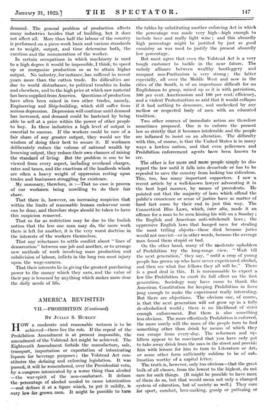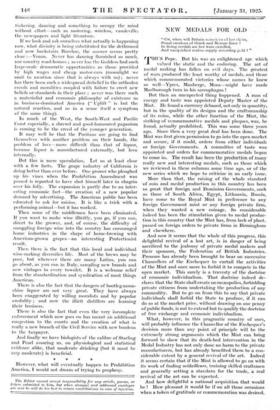AMERICA REVISITED
HOW a moderate and reasonable wetness is to be achieved—there lies the rub. If the repeal of the Prohibition Amendment is at present impossible, the ainendment of the. Volstead Act,might he achieved. The :Eighteenth Amendment .forbids the manufacture, sale, -transport, importation or exportation of intoxicating liquors for beverage purposes ; the Volstead Act con- stitutes the defining and enforcing legislation. It was passed, it will-be remembered, over the Presidential .veto, by.aeongress intoxicated by .a worse thing than alcohol —the war-spirit of the non-combatant. It defines the -percentage of alcohol needed to cause intoxication —and defines it at a figure which, to put it mildly,- is .v.ery low for grown men. It might be possible to turn the tables by substituting another enforcing Act in which the percentage was made very high—high enough to include beer and really light wine ; and this absurdly high percentage might be justified by just as good casuistry as was used to justify the present absurdly low percentage.
But most agree that even the Volstead Act is a very tough customer to tackle in the near future. The unholy alliance between wealthy bootleggery and rampant neo-Puritanism is very strong ; the latter especially, all over the Middle West and now in the cities of the South, is of an importance difficult for an Englishman to grasp, mixed up as it is with patriotism, 100 per cent. Americanism and 100 per cent: efficiency, and a violent Protestantism so arid that it would collapse if it had nothing to denounce, and unchecked by any mellow or respected body- of men with an educated tradition.
Two other courses of immediate action are therefore -sometimes proposed. One is to enforce the present law so strictly that it becomes intolerable and the people are inflamed to insist on an alteration. The difficulty with this, of course, is that the United States is in many ways a lawless nation, and that even policemen and -Prohibition -enforcement agents have been known to err.
The other is for more and more people .simply to dis• regard the law until it falls into desuetude or has to be repealed to save the country from looking too ridiculous. This, too, has many important supporters. I saw a - recent article by a well-known lawyer advocating it in --the best legal manner, by means of precedents. He pointed out that the majority of laws which offend the • public's conscience or sense of justice have as matter of • hard fact come by their •end in just this way. The Connecticut Blue -Laws, which, inter alia, made it an offence for a man to be seen kissing his wife on a Sunday ; the English and American anti-witchcraft laws ; the oppressive English laws that hanged men for stealing the most trifling objects—these died because juries would not convict—or in other words, because the average man found them stupid or bad.
On the other hand, many of the moderate upholders of Prohibition try the long-range view. " Wait till the next generation," they say, " until a crop of young people has grown up who have never experienced alcohol, and then see what fine fellows they all will be." There is a good deal in this. It is unreasonable to expect a law like Prohibition to exert its full effect on the first generation. Sociology may have cause to thank the American Constitution for keeping Prohibition in force long enough to make the experiment really interesting. But there are objections. The obvious one, of course, is that the next generation will not grow up in a fully de-alcoholized world ; there is no likelihood of strict enough enforcement. But there is also something less obvious. The more effectively Prohibition is enforced. the more surely will the mass of the people turn to find something other than drink by means of which they can escape f'rom every-day. The reformers and up- lifters appear to be convinced that you have only got to take away drink from the man in the street and provide him with- leisure for him to turn to Literature or Art, or some other form sufficiently sublime to be of ,sub- limation worthy of- a capital letter.
'The truth is,. however, only too obvious—that the great bulk .of all classes, from the lowest to the highest, do not -eare for such things. (It might be possible to have most ,of them do so, but that would mean, not only a changed -system of education, but of society as well.) They care lor sport, comfort, love-making, gossip or pottering or tinkering, dancing and something to occupy the mind without effort—such as motoring, wireless, vaudeville, the newspapers and light literature.
If we look and ask ourselves what actually is happening now, what divinity is being substituted for the dethroned and now backstairs Bacchus, the answer seems pretty clear :—Venus. Never has dancing flourished so much, nor country road-houses ; never has the Goddess had such large-scale democratic opportunities as those provided by high wages and cheap motor-cars (moonlight we omit to mention since that is always with us) ; never has there been such a widespread disbelief in the orthodox creeds and moralities coupled with failure to erect new beliefs orstandards in their place ; never was there such a materialist and economic philosophy of existence as in business-dominated America (" Uplift " is but the natural reaction, and so in a sense itself a symptom of the same thing).
In much of the West, the South-West and Pacific Coast especially, a shrewd and good-humoured paganism is coming to be the creed of the younger generation.
It may well be that the Puritans are going to find themselves with another problem on their hands, the problem of love—more difficult than that of liquor, because liquor is manufactured externally, but love internally.
But this is mere speculation. Let us at least close with a few facts. The grape industry of California is doing better than ever. before. One grower who ploughed up his vines when the Prohibition Amendment was passed is reported to have shot himself later in chagrin over his folly. The expansion is partly due to an inter- esting economic fact—the creation of a new popular demand by advertising. The American public has been educated to ask for raisins. It is like a trick with a performing animal—but it has worked.
Then some of the :middlemen have been eliminated. If you want to make wine illicitly, you go, if you can, direct to the grower, and, of course, the difficulty of . smuggling foreign wine into the country has encouraged home industries in the shape of home-brewing with American-grown grapes—an interesting Protectionist result.
Then there is the fact that this local and individual wine-making diversifies life. Most of the brews may be poor, but wherever there are many Latins, you can go about, as you can in Italy, sampling new brands and new vintages in every townlet. It is a welcome relief from the standardization and syndication of most things American.
There is also the fact that the dangers of bootleg moon- shine liquor are not very great. They have always been exaggerated by willing moralists and by . popular credulity ; and now the illicit distillers are learning their business.
There is also the fact that even the very incomplete enforcement which now goes on has meant an additional congestion to the courts and the creation of what • is really a new branch of the Civil Service with new burdens to the taxpayer.
And finally we have biologists of the calibre of Starling and Pearl assuring us, on physiological and statistical evidence alike, that moderate drinking (but it must be very moderate) is beneficial.
* * * Howiever, what will eventually happen to Prohibition America, I would not dream of trying to prophesy.















































 Previous page
Previous page